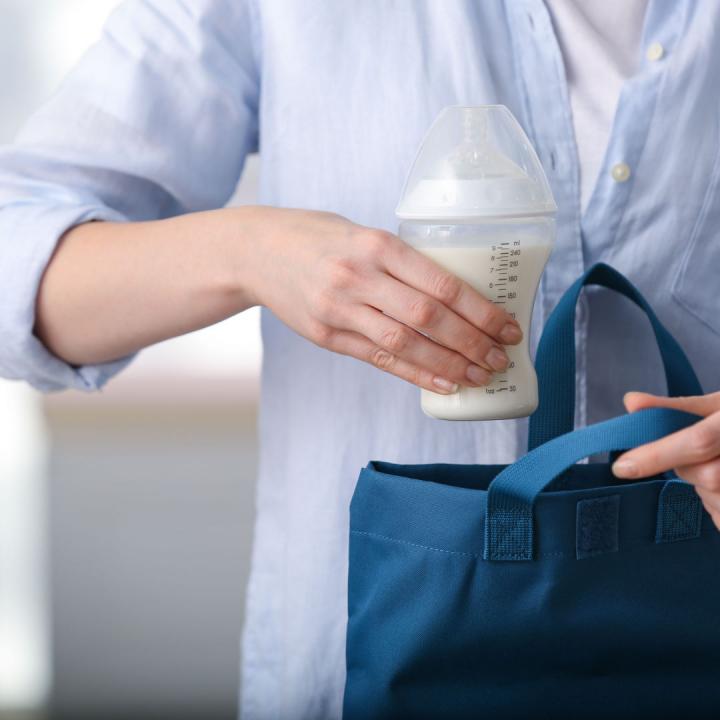Keeping your baby’s milk safe over summer

Milk is the perfect medium for bacteria and other microorganisms to grow. Babies have immature immune systems and drinking contaminated milk can cause them to become sick. It’s also important to sterilise their feeding equipment until 12 months of age, as well as always storing their milk safely.
It can be harder during the summer months to keep formula at a safe temperature, especially when we’re out and about. Ideally, prepare one bottle at a time just before offering it to your baby.
Making up your baby’s formula
Take your time when making up your baby’s formula. It’s important to get the ratio of scoops to water correct so your baby has the right nutrition to grow.
Always:
- Wash your hands before preparing your baby’s formula.
- Make up their formula exactly as per the manufacturer’s recommendations.
- Throw away any milk which your baby has not had within one hour of starting their feed.
- Use any opened tins of formula within one month of opening.
- Check the ‘use by’ dates on each tin of formula before offering to your baby. Never use formula after the expiry dates.
- Store unopened formula tins in a cool, dry place.
Transporting baby formula
How you transport formula is just as important as how you make it up. Just as we would be cautious about drinking milk which has been sitting outside of a fridge, this is not a safe practice for young babies.
- The safest way to transport formula is to keep the powder and water separate until just before feeding. If you need to transport pre-made bottles of formula, keep the formula very cold.
- An insulated carry bag is a practical option, though only keep formula for two hours, even when it’s been kept cold.
- Use any prepared formula within 24 hours of making it up.
- Store formula in the body of the fridge, towards the back where it is coldest. Use a fridge thermometer to check the temperature. Formula needs to be refrigerated to below 5°C within one hour of making it up.
- Not all babies prefer to drink warmed formula. Some like it to be cool, others at room temperature. Follow your baby’s cues (signals) to understand more about what they prefer.
10 things not to do with baby’s formula
- Store it at room temperature and carry it around. If you can’t keep formula cold, throw it away after one hour of being at room temperature.
- Make up a day’s worth of formula in readiness. The safest way to prepare bottles of formula is to make up one at a time, just before the baby’s feed time.
- Store leftover bottles of formula to offer later. Throw away any formula which your baby hasn’t finished within one hour. This is because bacteria from your baby’s mouth can get into the formula and cause it to become contaminated.
- Put the teat into your own mouth to ‘check’ the temperature of the milk. Instead, shake a drop or two of milk onto your forearm.
- Store bottles of milk in the door of the fridge. If you need to store bottles of pre-made formula, place them on the racks right at the back of the fridge.
- Warm formula in a microwave. This can cause milk to heat unevenly and lead to burning of a baby’s mouth and throat. Instead, place the baby’s bottle in a jug of hot water and wait until it warms a little.
- Make up homemade infant formula. This can be contaminated with harmful bacteria and not contain the nutrients babies need to grow and thrive. Always offer your baby formula which meets the regulations for manufacture and nutrition.
- Use straight tap water to make up your baby’s bottle. Although most Australian town water supplies are well regulated, sometimes water supplies can become contaminated. Boiling helps to kill microorganisms so it’s safe for babies to drink.
- Freeze formula. This can cause the milk solids and water in the formula to separate.
- Mix different types of formula together. If you are transitioning your baby onto a new formula, keep the bottles of different formula separate.
Who can I speak to about my baby’s formula feeding?
Your Child Health Nurse will be able to help you and offer you guidance on how to feed your baby safely. Your GP and paediatrician are also experts in baby care.
Written for Milton by Jane Barry, Midwife and Child Health Nurse, January 2023.
